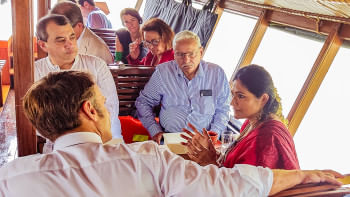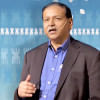Ode to a climate action maestro

The first time I saw Dr Saleemul Huq was some 30 years ago, probably at a meeting of the Disaster Forum, a disaster management platform for NGOs, run by Oxfam and funded by Aid Management Office Dhaka. As someone responsible for the Disaster Forum's funding, I used to attend all the meetings and had seen Dr Huq a few times. He used to speak on the issue of arsenic pollution of groundwater, which the country was grappling with at that time.
After a gap of many years, I saw him again in 2010, when he came to Dhaka after spending years at the International Institute for Environment and Development in the UK. At that time, Dr Huq was promoting community-based adaptation. Gradually, he set up the International Centre for Climate Change and Development (ICCCAD) in Dhaka. I kept meeting him in various meetings, and he made it a point to include me in his new ideas and initiatives, like ICCCAD's annual conference Gobeshona, which centres on locally-led adaptation and women climate leaders. I also met him in regional conferences, at UNDP corridors, and at the UN Women country representative's office.
Saleemul Huq was not only a visionary—exuding passion and love for a better future for people and the planet—he was an exceptional man who could show respect, care, and kindness to every individual he met, making each person feel special. He was also one of those rare people who have a combination of character and intellectual prowess; he truly respected women and girls. When he spoke about how important it is for aspects of gender equality to be mainstreamed in climate action, he truly believed in it; it wasn't lip service or he wasn't trying to just be politically correct. It was this belief of his that facilitated the signing of a memorandum of understanding between ICCCAD and UN Women in April this year.
We planned to do so many things together to promote gender equality and climate action in the country and at the global level! He was supportive of all the points I ever raised in any meeting, which of late have mostly been around gender equity and inclusivity in climate action, because he believed in those points himself. He believed in women's leadership capacity; he advocated for the capacity building of young girls to carry the torch of climate action.
Dr Saleemul Huq passed away on October 29, reportedly due to massive cardiac arrest, at his home. His death has shocked the entire climate action community at home and abroad, at a time when he was all active and preparing for the global climate summit COP28. About a month ago, when I wrote to him with regards to a COP28 side-event on women's leadership in locally-led adaptation, requesting him to be in the panel of discussants, within minutes, as was his habit, he replied, "Go ahead and take whatever time they offer you. Use my name in your programme." I'll be going to COP28—my first COP, and also the first-ever COP the world will have without you, bhaiya.
Dilruba Haider is a development professional and has been working with UN Women as Programme Specialist of Climate Change, DRR, and Humanitarian Actions.
Views expressed in this article are the author's own.
Follow The Daily Star Opinion on Facebook for the latest opinions, commentaries and analyses by experts and professionals. To contribute your article or letter to The Daily Star Opinion, see our guidelines for submission.

 For all latest news, follow The Daily Star's Google News channel.
For all latest news, follow The Daily Star's Google News channel. 







Comments